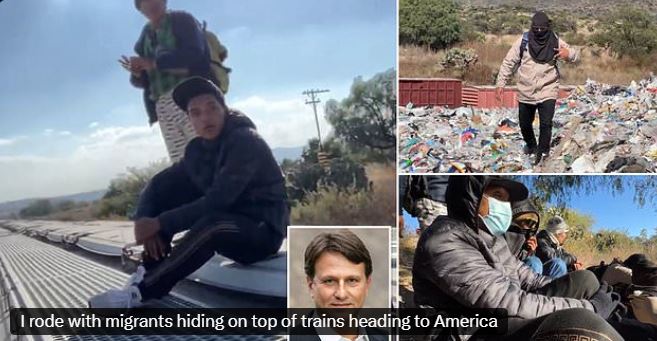
By Todd Bensman as published December 16, 2024 by The Daily Mail Online
HUEHUETOCA, Mexico – There were no signs of human life, just railroad tracks and a rough dirt road, six miles west of a small Mexican mountain town.
But this was definitely the place described to me.
On a recent trip to Mexico City’s sprawling migrant encampments, I heard again and again stories about groups of immigrants who were breaking away from these urban bases and disappearing into the vast highland wilderness outside the city.
Now, I’d gone to find them.
As my translator and I picked our way through the mountain landscape dotted with pines, prickly pear cacti and brambles 40 miles northeast of Mexico City, the high desert looked empty.
Then we spotted someone watching us from behind a cluster of rocks.
‘Not immigration!’ I shouted in Spanish. ‘Friendly journalists. Please show yourselves.’
With that, some two dozen bleary-eyed men, women and children emerged from their hidey holes.
They were in rough condition, having just weathered a night on bare ground, too frightened of roaming Mexican immigration officers to build fires and too cold to sleep.
They’d brought water jugs but no food, blankets or even the most rudimentary camping gear. All of them repeatedly begged me for something to eat. Unfortunately, I hadn’t brought anything.
‘We haven’t eaten since yesterday. We don’t have that much money,’ a Venezuelan man named Jesus told me.
Another young Venezuelan, who lost a leg in a motorcycle accident back home, navigated the rough terrain on crutches, an empty pant leg flapping wildly. They told me that other groups were camped in the area.
Why?
Most of the migrants I met in Mexico City said they were giving up on their plans to sneak into America. As I reported last week, these people were either returning to their home countries or settling in Mexico.
Clearly, threats from the incoming Trump administration to close the border and deport all illegals are having the desired deterrent effect.
Other migrants said they’d make up their minds before the President-elect’s January 20 inauguration, to see if the Biden administration would approve their applications for ‘humanitarian parole’.
Using the Biden-created ‘CBP One’ mobile app to lodge such claims, some 771,000 migrants have entered into the US since January 2023. Trump has said he’ll end the program on Day One.
But there is a contingent of migrants who are refusing to be turned away. These are the ones escaping from urban encampments into the woods, in a race against time to illegally cross the border before Trump’s swearing-in.

It’s hard not to conclude that these migrants were drawn here, in large part, by President Biden’s disastrous immigration policies, resulting in more than 10 million migrants entering the US during his term. The message that has been sent to the world the past four years is that, if you make it to the border, you’ll likely find a way to cross.
And indeed, as I soon learned, this group had been convinced by a particularly delusional rumor sweeping Mexico City’s migrant camps.
It’s their firm belief that on Wednesday, December 18, the US and Mexican governments are going to withdraw all troops and border guards, giving tens of thousands of migrants one last chance to cross the border before the coming Trump crackdown.
December 18 is ‘International Migrants Day’, declared by the United Nations in 2000, as a time to recognize the plight of migrants worldwide.
‘On International Migrant’s Day, they’re going to open the border gates,’ a young Ecuadorian man named Jason confidently explained to me.
Six men sitting around him nodded in agreement.
My US law enforcement sources tell me this is patently absurd, suggesting that Mexican cartels had concocted the rumor as a way to wring migrants for cash one last time before the era of Biden’s mass migration ends.
Nonetheless, I embedded myself for the day with this group of true believers – hailing from Ecuador, Colombia, Venezuela, Guatemala and Honduras – as they waited at a junction in the middle of the desert, where trains are known to stop for five to 10 minutes as the tracks are switched.
The migrants’ plan was to hitch a ride on top of a freight train for a dangerous three or four-day trip north. The ultimate destination: The border crossing at Eagle Pass, Texas.
Word was the next train was due at noon.

There were three mothers with six young children among the group of 25; only one of the kids was accompanied by a father.
The rest were single young men in their 20s, including several who admitted they’d illegally crossed the border before and made their way to Denver and Houston, only to be deported after serving time for crimes.
One of these men refused to allow me to record him on either audio or video. Another told me he had been arrested for driving under the influence of alcohol during his time in Denver.
Everyone was on edge – and for good reason.
Trump has threatened Mexico’s new president, Claudia Sheinbaum, with 25 percent trade tariffs if she does not do what she can to halt illegal migration.
In response, she has enhanced tough nationwide immigration enforcement operations. Mexican National Guard and immigration officers are patrolling rail lines with orders to capture every immigrant and ship them a thousand miles south to Mexican cities on the border with Guatemala.
The migrants fear that and more.
‘Mexican immigration takes your money away, whatever you have, they take it away,’ said Alexander, a 30-something Colombian. ‘We’re running away from them.’
Two young men anointed themselves lookouts to warn the others when strange vehicles approached. They asked me to hide my rental car in the brush.
As we waited for the noon train, a motorbike carrying a man and a woman pulled up on the dirt road running parallel to the train tracks.
‘Immigration knows you are all here,’ the man warned in Spanish. ‘They’ll take all of your cell phones and money and send you to Tapachula. Hide in the landfill.’
At this, the entire group bolted over the tracks to a mammoth fenced-off garbage dump and squeezed through holes in the chain link. The pile stunk terribly. In the refuse, the children found a feral dog nursing newborn puppies in a hole she’d dug.
Here we waited for several hours until a train horn sounded in the distance. Everyone rushed back through the fence, but were quickly disappointed. This train wasn’t going to work. The cars were cylindrical oil tanks – far too hazardous to ride on top of.
‘There’s no way they can get on,’ one of the lookouts said. ‘It’s going to be slippery. It’s very dangerous for the children on top.’
The wait continued.
More hours later, another train horn sounded. The migrants ran for it. The legless Venezuelan man on crutches somehow managing to keep up.
I followed close behind as the train stopped and the migrants scrambled up ladders onto the roof of one car. But, again, they were foiled.
A truck of armed Mexican National Guard troops and two immigration enforcement vans approached. Everyone rushed back down, dropping their backpacks off the train in a swirl of panic.
Seconds before the immigration vans arrived, they group disappeared into the brush.
I lingered to talk to the guards, but their vehicles never slowed. Though I could see that the two vans were full of migrants, perhaps caught elsewhere along the train line.
The train chugged away without anyone on it. And, shortly after, the migrants emerged from the brush once again.
This time, they refused to speak to me, hurrying off down the road… to a likely dead end.
